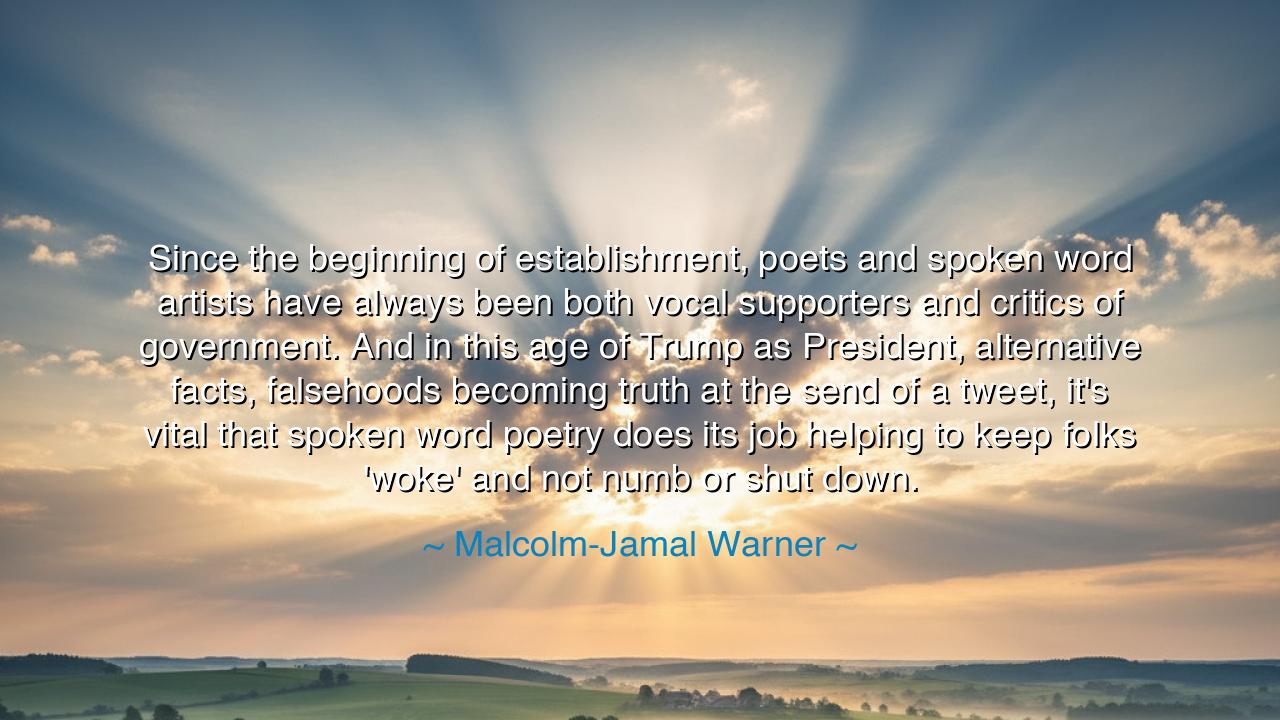
Since the beginning of establishment, poets and spoken word
Since the beginning of establishment, poets and spoken word artists have always been both vocal supporters and critics of government. And in this age of Trump as President, alternative facts, falsehoods becoming truth at the send of a tweet, it's vital that spoken word poetry does its job helping to keep folks 'woke' and not numb or shut down.






When Malcolm-Jamal Warner said, “Since the beginning of establishment, poets and spoken word artists have always been both vocal supporters and critics of government. And in this age of Trump as President, alternative facts, falsehoods becoming truth at the send of a tweet, it's vital that spoken word poetry does its job helping to keep folks 'woke' and not numb or shut down,” he spoke as one who remembers the sacred role of the artist as truth-teller. His words are not merely commentary on a political moment — they are a call to arms for all who wield language as a weapon of light. Warner reminds us that in times of distortion and deceit, the poet becomes the guardian of clarity, the one who keeps alive the conscience of the people when institutions fail to do so.
From the beginning of civilization, the poet has stood at the crossroads of power and truth. In the courts of kings, in the temples of priests, in the streets where common folk gather, it has always been the poet who dared to speak what others would not. The ancients knew this well. In Greece, Solon wrote verses that rebuked tyranny while teaching justice. In Persia, Rumi used mystic poetry to reveal the divine within the human. In Africa, the griot carried the memory of the tribe, speaking both of its glory and its shame. The poet’s tongue has forever been both a blessing and a burden — for where rulers build with stone and soldiers conquer with steel, the poet builds and conquers with truth.
Warner’s mention of “alternative facts” and “falsehoods becoming truth” evokes an age where reality itself is under siege — where words are twisted, and the line between honesty and deception dissolves with a keystroke. In such a time, the poet’s duty becomes not only artistic but sacred. The spoken word, unlike the written law or the filtered screen, carries the raw energy of the human soul — it cannot be silenced by algorithms or drowned in propaganda. Through rhythm and breath, through story and defiance, spoken word revives the ancient bond between language and justice. It wakes the sleeping spirit, stirs the blood, and reminds the heart that freedom begins with awareness.
The origin of Warner’s words lies in both history and his own lineage as an artist. A child of the cultural revolution that gave rise to hip-hop and modern spoken word, he grew up in a time when poetry was not confined to books but lived in the streets — in rhythm, in protest, in expression. The poet, in his world, is not a passive observer but a warrior of awareness, one who transforms pain into power. When Warner speaks of being “woke,” he echoes the ancient concept of enlightenment — to awaken from illusion and to see clearly the patterns of power that shape one’s world. His quote is not merely political commentary; it is an echo of a timeless truth: that art must serve the awakening of the people.
We see this power embodied in the life of Langston Hughes, who wrote during the Harlem Renaissance, singing the songs of both joy and injustice. Hughes did not flatter the nation; he challenged it. His poem “Let America Be America Again” spoke to the dream deferred — a dream that still drives the conscience of generations. Like Hughes, Warner calls upon poets to rise once more in their role as voices of resistance, to wield words not as ornaments, but as instruments of healing and revelation. For in times of confusion, it is not silence that preserves peace, but truth spoken boldly and beautifully.
This call is especially urgent in the digital age, where the tools that once united can now divide, where a single tweet can carry falsehood farther than the printing press ever carried wisdom. Warner’s words remind us that the spoken word — the unedited voice of the living human being — is one of the last refuges of authenticity. It is the campfire in the storm of misinformation, where people still gather to hear truth not from authority, but from heart. The poet’s voice, raw and unfiltered, cuts through illusion and reawakens the listener’s soul.
The lesson, then, is clear: never surrender your voice to silence or distortion. Each generation must raise its poets, its speakers, its storytellers — those who can remind the people who they are and what they stand for. Let your words serve justice; let them comfort the weary and challenge the powerful. If you see the world falling asleep in apathy, use your voice to awaken it. And if truth is buried beneath falsehood, let your speech be the shovel that unearths it.
For as Malcolm-Jamal Warner teaches, the poet’s task has not changed since the dawn of time — only its urgency has grown. In an age where lies fly faster than light, truth must travel by sound — by voice, by verse, by spoken flame. So let the poets speak, let the words burn, and let the people awaken once more, for when the artist keeps watch, the night can never fully conquer the dawn.






AAdministratorAdministrator
Welcome, honored guests. Please leave a comment, we will respond soon